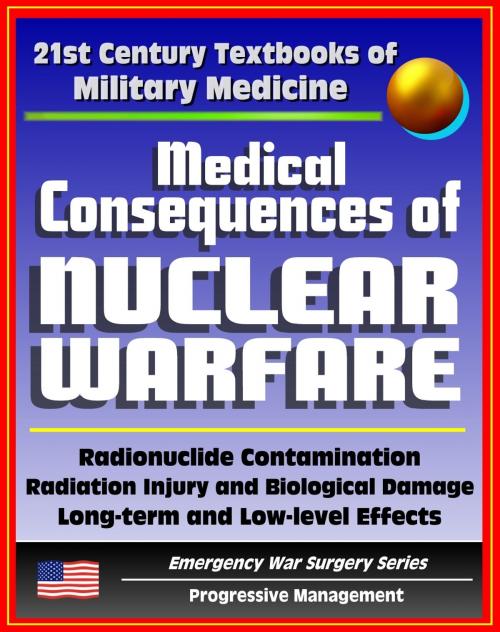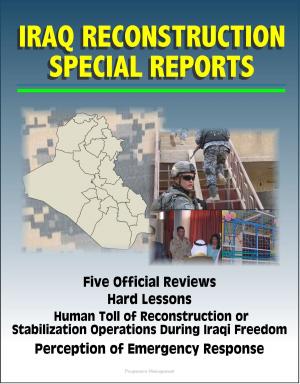21st Century Textbooks of Military Medicine - Medical Consequences of Nuclear Warfare: Radiation, Radionuclide Contamination, Power Plant Accidents, Chernobyl (Emergency War Surgery Series)
Nonfiction, Science & Nature, Science, Physics, General Physics, Health & Well Being, Medical, Reference| Author: | Progressive Management | ISBN: | 9781458073433 |
| Publisher: | Progressive Management | Publication: | March 21, 2011 |
| Imprint: | Smashwords Edition | Language: | English |
| Author: | Progressive Management |
| ISBN: | 9781458073433 |
| Publisher: | Progressive Management |
| Publication: | March 21, 2011 |
| Imprint: | Smashwords Edition |
| Language: | English |
From the much-referenced and highly acclaimed Textbooks of Military Medicine series, Medical Consequences of Nuclear Warfare provides a detailed review of nuclear events and their consequences, plus a comprehensive examination of the effects of radiation exposure on humans. Civilian and low-level effects are considered along with the military implications of nuclear warfare; there is also a discussion of the Chernobyl nuclear accident. Chapters cover:
Nuclear Events and Their Consequences
Acute Radiation Syndrome in Humans
Triage and Treatment of Radiation-Injured Mass Casualties
Treatment of Internal Radionuclide Contamination
Infectious Complications of Radiation Injury
Biological Assessment of Radiation Damage
Behavioral and Neurophysiological Changes with Exposure to Ionizing Radiation
Psychological Factors in Nuclear Warfare
Long-term and Low-level Effects of Ionizing Radiation
Radiological Considerations in Medical Operations
Prospects for Radioprotection
The likelihood of accidental detonations, small-yield nuclear attacks in regional conflicts, and radiation injuries in reactors and weapons plants increases as familiarity with this powerful force spreads. Given the devastating medical consequences that would follow a nuclear detonation or accident, the training of the medical corps in treating radiation syndromes will be a crucial factor in the effective management of casualties. The rapidly expanding science of medical radiobiology has greatly affected the prospective readiness of the military medical corps to deal with these injuries. The Armed Forces Radiobiology Research Institute has been a leader in the establishment of the base of scientific and clinical knowledge from which the current concepts of medical management have evolved. In addition to research, the institute is involved in continuing medical education and in our nation's emergency response system.
The first chapter is an overview of nuclear events and their consequences. The following chapters examine the effects of radiation exposure on humans and the ways they will affect triage, diagnosis, and treatment protocols as well as military logistics. A discussion of the latest prospects for radioprotection concludes the text. It is possible that no amount of knowledge or training will help any medical unit to deal with the mass casualties that a large-scale radiation incident or accident would incur. However, data from accidental and therapeutic radiation exposures, together with ongoing clinical research results, are all useful in determining the treatment of individual victims of smaller incidents who are in a position to be saved.
The most likely situations requiring a medical response are the use of weapons against a deployed naval force, a remote city, or a remote facility; a third-world conflict; a terrorist act; or an accident involving a nuclear weapon. Military medical preparedness can focus beyond nuclear weapon events. Today, nuclear material is used in medicine, industry, and power generation, bringing increased risk of occupational and accidental exposures. New radiation hazards in space will have to be overcome if successful peacetime and military uses of that frontier are to be realized. Military physicians trained to respond to weapons related injuries can bring expertise to these situations.
Weapons-related injuries can be best understood after examining the destructive forces––blast, thermal, and radiation–that produce them. In comparison with a conventional explosive weapon, a nuclear weapon's effectiveness is due to its unequalled capacity to liberate a tremendous quantity of energy in a very small space in an extremely short time. A simple description of the physical processes taking place within the first few thousandths of a second after a nuclear weapon detonation is presented.
From the much-referenced and highly acclaimed Textbooks of Military Medicine series, Medical Consequences of Nuclear Warfare provides a detailed review of nuclear events and their consequences, plus a comprehensive examination of the effects of radiation exposure on humans. Civilian and low-level effects are considered along with the military implications of nuclear warfare; there is also a discussion of the Chernobyl nuclear accident. Chapters cover:
Nuclear Events and Their Consequences
Acute Radiation Syndrome in Humans
Triage and Treatment of Radiation-Injured Mass Casualties
Treatment of Internal Radionuclide Contamination
Infectious Complications of Radiation Injury
Biological Assessment of Radiation Damage
Behavioral and Neurophysiological Changes with Exposure to Ionizing Radiation
Psychological Factors in Nuclear Warfare
Long-term and Low-level Effects of Ionizing Radiation
Radiological Considerations in Medical Operations
Prospects for Radioprotection
The likelihood of accidental detonations, small-yield nuclear attacks in regional conflicts, and radiation injuries in reactors and weapons plants increases as familiarity with this powerful force spreads. Given the devastating medical consequences that would follow a nuclear detonation or accident, the training of the medical corps in treating radiation syndromes will be a crucial factor in the effective management of casualties. The rapidly expanding science of medical radiobiology has greatly affected the prospective readiness of the military medical corps to deal with these injuries. The Armed Forces Radiobiology Research Institute has been a leader in the establishment of the base of scientific and clinical knowledge from which the current concepts of medical management have evolved. In addition to research, the institute is involved in continuing medical education and in our nation's emergency response system.
The first chapter is an overview of nuclear events and their consequences. The following chapters examine the effects of radiation exposure on humans and the ways they will affect triage, diagnosis, and treatment protocols as well as military logistics. A discussion of the latest prospects for radioprotection concludes the text. It is possible that no amount of knowledge or training will help any medical unit to deal with the mass casualties that a large-scale radiation incident or accident would incur. However, data from accidental and therapeutic radiation exposures, together with ongoing clinical research results, are all useful in determining the treatment of individual victims of smaller incidents who are in a position to be saved.
The most likely situations requiring a medical response are the use of weapons against a deployed naval force, a remote city, or a remote facility; a third-world conflict; a terrorist act; or an accident involving a nuclear weapon. Military medical preparedness can focus beyond nuclear weapon events. Today, nuclear material is used in medicine, industry, and power generation, bringing increased risk of occupational and accidental exposures. New radiation hazards in space will have to be overcome if successful peacetime and military uses of that frontier are to be realized. Military physicians trained to respond to weapons related injuries can bring expertise to these situations.
Weapons-related injuries can be best understood after examining the destructive forces––blast, thermal, and radiation–that produce them. In comparison with a conventional explosive weapon, a nuclear weapon's effectiveness is due to its unequalled capacity to liberate a tremendous quantity of energy in a very small space in an extremely short time. A simple description of the physical processes taking place within the first few thousandths of a second after a nuclear weapon detonation is presented.















